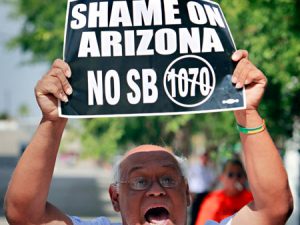How Being in the Minority Has Been Detrimental to Latino Immigrants in Arizona
May 9th, 2022
Sarah Samdani
How Being in the Minority Has Been Detrimental to Latino Immigrants in Arizona
I. Introduction
Throughout the 21st century, the state of Arizona has been in a battle against undocumented immigrants. The US-Mexico border has become infamous for its high numbers of border patrol officers, with U.S. Border Patrol agents nearly doubling from Fiscal Year 2003 to Fiscal Year 2019. Some citizens in Arizona have also taken it upon themselves to form their own border “vigilante” groups. Numerous of these groups have gained support from lawmakers, with some legislators even becoming members. Injustices are occurring against immigrants at these borders and within the walls of Arizona’s jails and detention centers, with documented incidents of illegal physical and psychological abuse of immigrants. In this state, the opportunity for injustice can happen swiftly when a police officer has the ability to stop and question a person simply for “looking foreign.” Arizona is also home to heavily-armed border vigilante groups that harass and intimidate immigrants into not voting or seeking necessary services. But one must ask: is there not something wrong with a state system that continuously elects officials who openly advocate for discriminatory policies against the undocumented? By discouraging political participation, passing unjust legislation that targets immigrants, and re-electing officials who pass legislation that disproportionately affects immigrants, voters in Arizona exclude immigrants from the democratic process and bolster the racial subordination and criminalization of Mexican immigrants.
II. The Discouragement of Immigrant Political Participation
First, it is important to take the political demographics of Arizona into consideration. One in eight Arizona residents is an immigrant. This means that in any given Arizona neighborhood, one can expect their child’s peer or local business owner to be an immigrant. Immigrant families also contribute billions of dollars to the Arizona economy. In 2018, Arizona residents in immigrant-led households had $21.1 billion in spending power. Despite all this, immigrants in Arizona are viewed as outsiders, largely because of the political atmosphere of the state. Republican voters of Arizona have prioritized immigration as “the most pressing issue,” even above jobs and the economy. As a result, Republican candidates are expected to put a spotlight on immigration policies because of its high importance to voters. The official platform of the Republican Party in 2016 advocated for more security along the southern border with the construction of a border wall and less opportunity for illegal citizens. By using employment verification technology and implementing restrictive entitlement programs, illegal citizens would not have access to the same jobs and benefits as legal citizens. The 2016 GOP platform itself asserted that “illegal immigration endangers everyone, exploits the taxpayers, and insults all who aspire to enter America legally…Our highest priority, therefore, must be to secure our borders and all ports of entry and to enforce our immigration laws.” Consequently, right-leaning voters and lawmakers in Arizona believe in increased defenses against immigrants who may be undocumented.
The voting habits and political decisions of Republicans in Arizona are relevant because of the significance of Republican-leaning voters and politicians in the state. In the past 10 presidential elections, Arizona voted Republican in eight out of the ten elections. At the state government level, both Arizona’s Senate and House are controlled by Republicans. There is a small gap between Democrats and Republicans in the state’s legislative branch, yet that gap is what ultimately makes a difference when it comes to the passing of bills that disproportionately impact Mexican immigrants. If a new Republican border enforcement bill were to be introduced tomorrow to the Arizona state legislature, it would more than likely pass due to the greater number of right-leaning members. Because of their prominence in Arizonian politics and strong use of anti-immigrant rhetoric, such as “securing the border,” politicians contribute to broader public criminalization of immigrants. Therefore, immigrant voters will more than likely be intimidated into not voting or altogether not participating in a political system that denounces them.
As such, a problem arises when the majority of citizens in Arizona ––non-immigrants–– hold particular views that place another group––immigrants, particularly Mexican immigrants ––in jeopardy. More than half of Arizona’s immigrants originated from Mexico, making Latino immigrants carry an even larger target on their backs. When non-immigrant voters who view immigrants as criminals step into the voting booth, they place immigrants’ rights and needs in danger. This is particularly seen when minority immigrant groups feel discouraged from voting or perceive that their vote does not matter because the majority group’s interests will prevail. Political theorist Alexis de Tocqueville addresses this issue by stating that “majority rule is especially dangerous in the United States because its legal system bestows all power in the hands of those supported by majority vote.” The majority vote can be a gift that easily turns into a weapon, particularly when it falls into the wrong side’s hands. At the state level, Arizona’s right-leaning voters have again and again designated individuals who support prejudiced policies into power, while Democrats in the state’s House and Senate fail to make up the majority.

Source: NPR
Proponents of Arizona’s strict immigration policies may argue that if elected officials are the problem, then Latinos should simply come out in large numbers and vote against these officials to elect them out. However, as an ethnic group, Latinos have been less likely to vote than the average American. This is partly attributed to the documented difficulties of prejudice and language barriers. Additionally, the threat of stricter border control and crackdowns on the undocumented discourages Latino political participation. Citizen-led groups like Minutemen and Ranch Rescue are prime examples of this, as these organizations are run by citizens who have “given themselves the task of enforcing U.S. immigration laws and policies.” To top it all off, civilian border patrol volunteers have themselves admitted to intimidating voters and keeping polling stations under surveillance to “deter the undocumented from voting,” which ultimately prevented legal immigrants from voting. Because the Latino group as a whole is viewed as unlikely to vote, politicians are able to use anti-immigrant rhetoric to excite voters who feel the same way toward immigrants.
III. Arizona’s Growing Perception of Immigrants as Threats
Unfortunately, the public’s ignorance on the true levels of crime allows them to be easily swayed by vicious politicians who criminalize immigrant populations. Arizona’s predominantly white majority––which has not experienced the same discrimination by law enforcement or voter discrimination as immigrant populations––can be significantly influenced by political candidates. In “Too Much Democracy or Too Much Crime? Lesson from California’s Three-Strikes Law,” author Gary LaFree writes, “The public’s naive and ill-informed concerns about crime make them an easy target for unscrupulous politicians.” Viewing one’s legislators as supporters of anti-immigration can therefore be detrimental to how a citizen views immigrants as a whole. In particular, several actors in the legal and political sphere have associated an immigrant without papers with a person who should be feared. What is more, some of Arizona’s lawmakers associate themselves with border vigilante groups. For example, Republican Joseph Sweeney volunteered to participate in the Minuteman group, a self-described “citizens’ Vigilance Operation monitoring immigration, business, and government.” It is for these reasons immigrants continue to be perceived as threats, leading Republican voters to elect officials who are tough on immigration, and then causing the passing of state laws that focus on punishing anyone who is undocumented.
One final comment on the inability of Latino voters to fully participate in the democratic process is the all-affected interests principle. As political theorist Joseph Lampert describes it, “this principle holds that anyone whose interests are affected by a decision should be included in the institutions and procedures that make that decision.” Evidently, immigrants are impacted by immigration policies. Why is it then, that citizens are able to intimidate legal immigrants on their way to voting simply because they are members of “border vigilante” groups?
IV. Passage of Legislation that Targets Immigrants
The power dynamics of Arizona elections which prevent immigrant participation in elections have led to discriminatory policies that negatively affect immigrants, who make up only a minority in elections. In particular, Republican residents and lawmakers of Arizona have pushed for the passage of legislation that disproportionately affects undocumented immigrants, claiming it is all to “protect the border.” The Arizona state government passed S.B. 1070 in 2010, which contained sections implying that racial profiling should be used by officials when determining whether or not to stop a person who they believe is undocumented. Challenges to this law were taken up to the Supreme Court. The four main provisions of S.B. 1070 that the Court considered were the following: police may demand papers and look into immigration status if they suspect someone is undocumented, police may arrest individuals without a warrant if they believe that person is deportable, immigrants who do not carry their federal registration papers are guilty of a state crime, and immigrants who look for or accept work without authorization are guilty of a state crime. The Supreme Court struck down three of these main provisions but upheld the first provision allowing for profiling based on suspected immigration status.

Opponents of the law found this quite troublesome, for after reading just Section 1 of S.B. 1070, it became clear that this legislation was “a textbook example of how facially neutral language can obscure and rationalize racial impacts, if not a discriminatory intent.” When S.B. 1070 was brought to the courts, the U.S. government consciously avoided any complaints that the law would lead to racial profiling of Latinos. Still, certain parts of S.B. 1070 allowed the consideration of race to be one of the factors in the law’s enforcement. The Supreme Court itself proclaimed that “Mexican appearance” is permissible as a factor used by border enforcement officers. Evidently, law enforcement and border patrol officers could rather easily engage in racial profiling under a law that practically endorsed it. With Provision 1 of S.B. 1070 upheld by the Supreme Court, Arizona lawmakers had a victory on their side. If police suspect someone with a “Mexican appearance” to be undocumented, they can demand to see the person’s papers. Unfortunately, immigrants have little motivation to vote for candidates that would advocate for their protection because of legislation like S.B. 1070 that implicitly creates a political system where immigrants are the enemy. Since the Supreme Court did not explicitly assert where state governments stand in the hierarchy of immigration regulation, strict laws like S.B. 1070 will likely continue. Arizona relied upon state legislation to help criminalize conduct that was previously not criminalized. As a result, minority rights were drowned out by the votes of the majority.
V. Re-electing Officials with Clear Racial Bias
Lastly, citizens of Arizona have elected law enforcement officers who contribute to the criminalization of Mexican immigrants and threaten their democratic participation. Perhaps the most infamous illustration of this is former Sheriff Joe Arpaio. Arpaio was sheriff of Arizona’s Maricopa County for 24 years and prided himself on his tough-on-crime approach. For example, Arpaio implemented immigration patrols in which large crowds of sheriff’s deputies concentrated on urban areas of Phoenix, including areas with dense Latino populations. These deputies would stop traffic violators and arrest others who caught their attention as potential lawbreakers. 20% of the traffic stops conducted during these sweeps violated Fourth Amendment protections. Guards in Arpaio’s jails would go so far as to put Spanish-speaking inmates in solitary confinement if they could not understand a command given to them in English. Eventually, Arpaio was convicted of criminal contempt for breaking a court order demanding he stop his immigration patrols. A Department of Justice expert asserted that Arpaio supervised the “worst pattern of racial profiling by a law enforcement agency in U.S. history.”

Source: The Arizona Tribune
In the same way, Arpaio faced over 6,000 lawsuits in federal courts. Some of them included settlements as high as $3.5 million in a lawsuit claiming Arpaio’s office mishandled the rape investigation of a 13-year-old girl to an $8.25 million suit for the asphyxiation death of a man in one of Arpaio’s jails. Despite the many injustices that took place during his time in office, Arpaio has stated he would “do it all over again,” indicating absolutely no regrets for the wrongs that occurred under his authority. The majority of Arizona’s voters elected a sheriff who clearly prided himself on racially biased tactics for six terms, which indicates that many voters saw a solution to the “immigration problem” in the form of Sheriff Arpaio. Meanwhile, the Democratic-leaning Latino population in Arizona was too small in numbers to vote out the sheriff, producing a six-term officer with clear anti-immigrant sentiment.
VI. Conclusion
All in all, I argue that Arizona’s citizens have repeatedly demonstrated the adverse consequences of when a group is deprived of participation in the democratic process and then must reap the consequences of not being able to do so. The law enforcement officials and legislators who get elected hyperfocus on whether or not Mexican immigrants entered the United States legally rather than objectively accept them as citizens. By means of racial subordination, criminalization, and intolerant legislation, some of Arizona’s officials are succeeding in limiting the advancement of undocumented immigrants. On a national level, politicians like Donald Trump echo notions of Mexicans’ “inferiority” to boost their own standing in the political sphere and disguise the actual prejudice they feel, and voters continue to support them. Criminalization is achieved by these political actors who perpetuate the image of Mexican immigrants as “aliens”’ with the help of the media. To top it all off, there is no sign that our current system of democracy will change anytime soon. There lingers the possibility of more Sheriff Arpaios and S.B. 1070s to pass, albeit in different forms. Certain voters do not want to see more immigrants enter the U.S., which they believe should be full of citizens who entered legally. But this may be an unfeasible expectation for America, a refuge for many when they face times of need and poverty.
Bibliography
270towin.com, “Arizona”, Electoral Ventures LLC (n.d.), https://www.270towin.com/states/Arizona.
ACLU, “Frequently Asked Questions about the Arizona Racial Profiling Law,” ACLU, (n.d.), https://www.aclu.org/other/frequently-asked-questions-about-arizona-racial-profiling-law.
ACLU, “SB 1070 at the Supreme Court: What’s at Stake.” American Civil Liberties Union, 2022. https://www.aclu.org/sb-1070-supreme-court-whats-stake.
American Immigration Council, “Immigrants in Arizona,” American Immigration Council, August 6, 2020, https://www.americanimmigrationcouncil.org/research/immigrants-in-arizona.
American Immigration Council, “The Cost of Immigration Enforcement and Border Security,” American Immigration Council, January 20, 2021, https://www.americanimmigrationcouncil.org/research/the-cost-of-immigration-enforcement-and-border-security.
Arizona State Legislature, “Member Roster,” Arizona State Legislature (n.d.), https://www.azleg.gov/memberroster/.
Associated Press. “Arizona sheriff Arpaio’s immigration patrols targeting Latinos to cost public $200M”. NBC News. Last modified May 18, 2021, https://www.nbcnews.com/news/latino/arizona-sheriff-arpaios-immigration-patrols-targeting-latinos-cost-pub-rcna955.
Associated Press. “With the latest payout, former Sheriff Joe Arpxaio has cost Arizona taxpayers $100M,” NPR. Last modified October 29, 2021. https://www.npr.org/2021/10/29/1050490391/joe-arpaio-legal-costs-100-million-arizona-sheriff.
Bordow, Scott, “ASU alum, market research expert shares results from latest Arizona Public Opinion Pulse,” Arizona State University, February 11, 2022, https://news.asu.edu/20220210-arizona-impact-economy-immigration-top-issues-arizona-voters.
Felbab-Brown, Vanda and Elisa Norio, “What border vigilantes taught US right-wing armed groups,” The Brookings Institution, March 12, 2021, https://www.brookings.edu/articles/what-border-vigilantes-taught-us-right-wing-armed-groups/.
González de Bustamante, Celeste, “Arizona: The History of a State of Exclusion, 1912-2012” in Arizona Firestorm: Global Immigration, Realities, National Media, Provincial Politics. (Rowman and Littlefield, 2012) 19, https://www.researchgate.net/publication/283731778_Arizona_The_History_of_a_State_of_Exclusion_1912-2012.
Johnson, Kevin R., “A Case Study of Color-Blindness: The Racially Disparate Impacts of Arizona’s S.B. 1070 and the Failure of Comprehensive Immigration Reform,” UC Irvine Law Review 2, Rev. 313 (2012) 316-35, https://scholarship.law.uci.edu/ucilr/vol2/iss1/9/.
LaFree, Gary, “Too Much Democracy or Too Much Crime? Lessons from California’s Three-Strikes Law”, Law & Social Inquiry 27, no. 4 (2002): 885-93, https://www.jstor.org/stable/829059?seq=1.
Lampert, Joseph, “Democratic Inclusion and the Governance of Immigration,” Social Theory and Practice 41, no. 1 (2015): 53, https://www.jstor.org/stable/24332318.
Martinez, Conner, “El Pueblo Unido: How Threats Increased Latinx Turnout in Arizona’s 2020 General Election,” The Graduate Center, City University of New York, June, 2021: 6, https://academicworks.cuny.edu/cgi/viewcontent.cgiarticle=5405&context=gc_etds.
Nùñez, Adalgiza A, “Civilian Border Patrols: Activists, Vigilantes, or Agents of Government?,” Rutgers Law Review 60, no. 3 (2008): 797-818, http://rutgerslawreview.com/wp-content/uploads/2011/08/Civilian-Border-Patrols-Activists-Vigilantes-or-Agents-of-Government.pdf.
“Republican Platform 2016”, GOP Convention 2016 (2016): 25-6. https://prod-cdn-static.gop.com/media/documents/DRAFT_12_FINAL%5B1%5D-ben_1468872234.pdf.
RepublicanViews.Org, “Republican Views on Immigration,” Republican Views, November 25, 2014, https://www.republicanviews.org/republican-views-on-immigration/.
Schwartz, David, “‘America’s toughest sheriff’ in close race to win back old job”, Reuters, August 4, 2020, https://www.reuters.com/article/us-usa-election-arpaio/americas-toughest-sheriff-in-close-race-to-win-back-old-job-idUSKCN2501AU.
Stern, Ray, “Sheriff Joe Arpaio’s Office Commits Worst Racial Profiling in U.S. History, Concludes DOJ Investigation,” Phoenix New Times, December 15, 2011, https://www.phoenixnewtimes.com/news/sheriff-joe-arpaios-office-commits-worst-racial-profiling-in-us-history-concludes-doj-investigation-6655328.
United States Census Bureau, “QuickFacts Arizona”, United States Census Bureau (n.d.), https://www.census.gov/quickfacts/AZ.